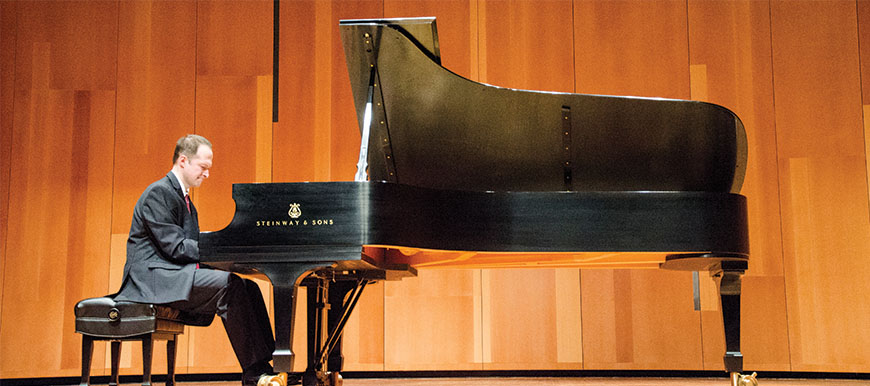Russian Recital gets classy at USU
Utah State University’s Music Department hosted the “Russian Recital,” featuring world-renowned pianist Nikolai Choubine and soprano Cindy Dewey. The recital took place on March 17 in the Caine Performance Hall.
The “Russian Recital,” Choubine’s idea, was in the works for no more than five weeks.
“It was nice working with Nikolai on Rachmaninoff because he is a native Russian speaker,” Dewey said. “We had just met doing this. We’ve had a fun time.”
When Dewey was approached about participating in the recital, she was enthusiastic.
“If you’re a singer and someone asks if you want to sing Rachmaninoff, you say yes,” Dewey said. “It is hard, but it is so pretty.”
Choubine chose the final two songs to commemorate the 100-year anniversary of the death of composer Alexander Scriabin. He said the music choices seemed “appropriate.”
“It is not all lush and romantic,” Dewey said. “A couple of songs are really simple, and there is definitely something that tugs at the heartstrings.”
The pieces, played in chronological order, are set to show the shift in music styles during the Romantic era, which was heavily influenced by nationalism following the revolution.
The first piece took over the first half of the concert. This is because “Pictures in an Exhibition,” composed by Modest Mussorgsky, is a musical depiction of an exhibit of over 400 paintings, Choubine said.
“One day he was just walking around and saw the pictures and got inspired to write this piece,” Choubine said. “This piece is so authentic. It is so different from the musical language of Tchaikovsky and Rachmaninoff.”
The two other featured composers were Sergey Rachmaninoff and Alexander Scriabin. Choubine said these composers, among others, represent classical Russian music.
“All of these composers are rhythmically interesting,” Dewey said. “That’s one thing I really like about Russian music: It has rhythmic energy.”
Choubine and Dewey both expressed their passion for music and their thoughts on why more people are not into classical music like they once were.
“Classical music was once the popular music,” Dewey said. “It’s a new concept for classical music to be separate from the popular.”
He said it’s not as fun listening to opera or classical music without actually being present in a live performance.
“I think that there just has to be more of it around,” Choubine said. “The breadth and scope of classical music is unparalleled. But it is in danger of becoming a museum art.”
He compared it to the new and old of literature.
“People like to read comic books, but Shakespeare is still there,” Choubine said.
Senior Lisa Richards and junior Samantha Bunderson, both piano performance majors, attended the concert and had nothing to say for it but praise and approval.
“It was very good and very impressive,” Richards said. “It represented Russian composers well.”
Both Richards and Bunderson expressed their thoughts on hearing Dewey sing.
“Rachmaninoff is definitely one of my favorite composers, and I haven’t heard a lot of his vocal stuff,” Bunderson said. “I really like Cindy’s voice.”
Though she had never heard Dewey perform before, Richards said that Dewey’s voice was “strong and so powerful.”
Their appreciation continued as they described their reaction to Choubine’s performance.
“It was very good and very impressive,” Richards said. “He has such a delicate sound. It is so pretty.”
Bunderson agreed.
”The thing that struck me the most is that he just makes it look so effortless,” Bunderson said. “Very few people can do that. We all play differently, but he captures the musicality so well.”
After what the audience thought was the final song, Choubine came back onto the stage and announced he would be playing Louis Moreau Gottschalk’s famous piece “The Banjo.”
“Just thinking of the quality of concert, that was so professional,” Bunderson said. “It was fabulous. I wish that more people had known about it.”
— monica.a.delatorre@gmail.com

